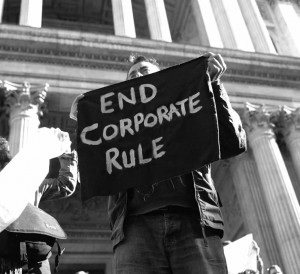 Time again to strap on your armbands, kick off your flip flops, and go for swim in the dark waters of the derivatives market. Careful not to swallow anything – this water is toxic.
Time again to strap on your armbands, kick off your flip flops, and go for swim in the dark waters of the derivatives market. Careful not to swallow anything – this water is toxic.
Last edition, you’ll remember (how could you forget?) we talked about Credit Default Swaps: how they’re a kind of insurance against risk. Let’s say you own a chunk of debt – some Greek government bonds, for example – and you want to insure yourself against a default on the debt, you buy some risk protection (a CDS) – you pay the CDS seller some money, in return for your money the seller underwrites the debt. So if the Greek government defaults, it’s payday.
The CDS has a value (it’s a pledge to pay), and can be traded on, like any other derivative. Tony Crawford, a campaigner against derivatives at petition44.com, calls a CDS a “Non-bank Note”. He explains: “a CDS is a Non-bank Note filled out for debt signed by its ‘Maker’ [the seller] as a promissory note to pay cash to its ‘Holder’ [the buyer].”
But here’s the twist. What if you don’t own the government bonds, but you take out insurance against them defaulting anyway? It’s not your debt, but you’re insuring against it defaulting, so if it defaults, you get paid. You’re betting on a default. The Greek government defaults, you win. The economy goes down the toilet, and you’re flush with cash.
What we’ve just described is a “Naked Credit Default Swap”. It is, in the words of Tony Crawford, “a CDS sold with no underlying security to purchasers” – and why they’re so dodgy is that “so-called Naked Credit Default Swaps make no financial sense except as surefire instruments to profit from Non-bank Notes in default.” We’re talking no-strings profit created from a loss. It’s so bizarrely unethical that it’s hard to comprehend that these financial instruments of doom could have been allowed to exist.
And not just exist. Flourish. “Allowing naked CDS trading resulted in the creation of a massive gambling opportunity – a lottery of unprecedented size” (Willem Buiter, in the FT, March 2009). It created a casino of doom.
And here’s what’s super-creepy: it’s been estimated that Naked CDSs are up to 80% of the credit default swap market. When someone as money hungry as the billionaire convicted fraudster and serial currency crasher George Soros calls them “toxic”, you should take note. Of CDSs he says: “Only those who own the underlying bonds ought to be allowed to buy them” – and not sold to “others who want to speculate against countries or companies.”
Again, to recap, just so we’re clear: a Naked Credit Default Swap is a ‘side bet’. It comes into existence when the policy is taken out “without ownership of the underlying securities… Naked CDSs are the instrument of choice for those who take large bets against European governments, most recently in Greece” (Wolfgang Münchau, in the FT, February 2010). So when you see Greeks throwing bricks and lobbing rocks, don’t forget: other folk are popping champagne corks.
But let’s end on an upnote. Recently, the EU Parliament agreed on regulation designed to outlaw NCDS, regulation which is scheduled to come into force in November 2012. So watch this space. And in the meantime, now that your toe has properly been dipped into the CDS and NCDS market, it’s time for you to strip off your shorts and take a wild leap into the whacky world of short selling, sovereign debt, and hedge funds. Have fun, and don’t forget to breathe.




